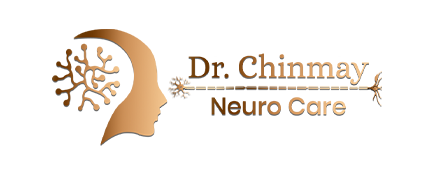
What is Epilepsy?
Epilepsy, also known as a seizure disorder, is a neurological condition characterized by recurrent and unprovoked seizures. It is one of the most common disorders of the nervous system, affecting approximately 1.2% of people in India alone. While some epilepsies can be easy to treat, difficult and resistant cases of Epilepsy needs special expertise to handle such tricky situations. Dr. Chinmay has vast experience and expertise in handling such complex epilepsy cases in Adults as well as Pediatric population.
What are causes of Epilepsy?
The exact cause of epilepsy can vary. It can result from factors that disrupt the normal functioning of the brain, such as brain injuries, infections, tumors, strokes, or congenital malformations. Epilepsy can also be caused by an imbalance in neurotransmitters, the brain’s chemical messengers that control nerve signaling. In many cases, however, no specific cause is identifiable, and epilepsy may develop without any apparent reason. In fact, the condition can sometimes run in families, suggesting a genetic component in some types of epilepsy.
Certain conditions, like high fever, low blood sugar, or brain injury, can trigger seizures in anyone, even in individuals without epilepsy. However, when a person experiences two or more recurrent, unprovoked seizures, they are diagnosed with epilepsy.
Symptoms of Epilepsy:
The symptoms of epilepsy can vary greatly depending on the type of seizure, the part of the brain involved, and the individual. Here are some common symptoms associated with epilepsy:
- Seizures
The hallmark symptom of epilepsy is the occurrence of recurrent, unprovoked seizures. These can manifest in different ways:
- Generalized Seizures (affecting both sides of the brain):
- Tonic-clonic seizures (formerly called grand mal seizures): This involves stiffening of the body (tonic phase) followed by shaking and jerking (clonic phase). It is often associated with loss of consciousness.
- Absence seizures (formerly petit mal seizures): Brief episodes of staring or “zoning out,” which can last for a few seconds and may not be noticeable to others.
- Myoclonic seizures: Sudden, brief jerks or twitches of a muscle or group of muscles.
- Atonic seizures: Sudden loss of muscle strength, which can cause the person to fall to the ground.
- Focal Seizures (affecting one part of the brain):
- Focal aware seizures: Seizures where the person remains conscious, but may experience abnormal sensations, or involuntary movements like twitching, or jerking of a limb or body part.
- Focal impaired awareness seizures: The person may lose awareness or consciousness, and may engage in repetitive movements like lip-smacking, hand movements, or staring.
- Aura
Some people with epilepsy experience an aura before a seizure, which can serve as a warning sign. An aura is a type of focal seizure that can involve:
- Unusual sensations (e.g., tingling, dizziness, or numbness).
- Behavioural arrest, Amnesia (memory loss), Gastric disturbances
- Strange smells or tastes.
- Visual disturbances (e.g., flashing lights or seeing unusual colors).
- Emotional changes (e.g., a feeling of déjà vu or intense fear).
- Loss of Consciousness
In many types of seizures, the person may lose consciousness or awareness during the event. This can vary in duration, and recovery may involve confusion, fatigue, or disorientation.
- Confusion or Memory Loss
After a seizure, individuals may experience confusion, memory loss, or a sense of being “out of it.” This can last for several minutes to hours, depending on the severity of the seizure.
- Uncontrolled Movements
Seizures can cause involuntary movements, such as:
- Jerking or twitching of the limbs, face, or entire body.
- Stiffening or rigidity of muscles.
- Repetitive movements such as lip-smacking, hand-wringing, or repetitive vocalizations.
- Emotional or Behavioral Changes
Some individuals may experience sudden mood changes or behavioral symptoms, such as:
- Anxiety or fear before or after a seizure.
- Unexplained feelings of déjà vu or intense fear.
- Aggression or irritability in some cases.
- Physical Symptoms
- Headache.
- Nausea or vomiting (sometimes following a seizure).
- Loss of bladder or bowel control (can occur during a seizure).
Epilepsy treatment by Dr. Chinmay Kumbhar.
Dr. Chinmay has extensive experience in handling Adult as well as pediatric (children) Epilepsy patients with utmost empathy, and care and with abiding to the latest guidelines and newer treatment modalities. While some epilepsies can be easy to treat, difficult and resistant cases of Epilepsy needs special expertise to handle such tricky situations. Dr. Chinmay has vast experience and expertise in handling complex epilepsy cases in adults and the pediatric population.
We are dedicated to provide you the best in class treatment for epilepsy, according to the latest guidelines and recommendations, helping you in improving the quality of life and living a seizure-free confident life.
Holistic care is what makes us special. We understand that the caretaker needs as much support and help as does a patient suffering from Epilepsy.
Types of Epilepsy
Epilepsy is a neurological disorder characterized by recurrent, unprovoked seizures. There are several types of epilepsy, and they are often classified based on the type of seizures, the part of the brain affected, and the underlying cause (if known). Here are some of the main types of epilepsy:
- Focal Epilepsy (Partial Epilepsy)
Focal seizures start in one area of the brain and can be classified as:
Focal Aware Seizures (Simple Partial Seizures):
These seizures involve a small part of the brain and the person remains conscious during the episode.
Symptoms may include involuntary movements, strange sensations, or emotional changes, such as déjà vu, intense fear, or nausea.
Focal Impaired Awareness Seizures (Complex Partial Seizures):
These seizures involve a larger part of the brain and cause a loss of awareness.
The person may stare blankly, perform repetitive movements (e.g., lip-smacking or hand-wringing), and may not remember the seizure afterward.
- Generalized Epilepsy
Generalized seizures affect both sides of the brain and can cause loss of consciousness. Some common types of generalized seizures include:
Tonic-Clonic Seizures (Grand Mal Seizures):
This is one of the most recognizable forms of epilepsy, characterized by stiffening of the body (tonic phase) followed by rhythmic jerking (clonic phase). The person usually loses consciousness and may also lose bladder control or bite their tongue.
Absence Seizures (Petit Mal Seizures):
These seizures cause a brief lapse in consciousness, often just a few seconds. The person may appear to be staring off into space, and there may be subtle movements like rapid eye blinking.
Myoclonic Seizures:
These involve brief, jerky movements of a muscle or group of muscles, often appearing as quick twitches of the arms or legs. The person remains aware during the episode.
Atonic Seizures:
Also known as “drop attacks,” these seizures cause sudden loss of muscle tone, leading to a collapse or fall. The person may lose control of their body and fall to the ground.
- Temporal Lobe Epilepsy (TLE)
This is the most common form of epilepsy that affects a specific area of the brain called the temporal lobe. Seizures may involve:
Aura: A warning sign before the seizure, which could include strange tastes, smells, feelings of fear or déjà vu, or nausea.
Impaired Awareness: The person may experience a blank stare or repetitive movements, such as lip-smacking or hand rubbing and behavioural arrest.
Memory Issues: TLE can often affect short–term memory, with patients sometimes having difficulty recalling events after the seizure.
- Absence Epilepsy
Common in children, absence seizures cause brief lapses in awareness and are often mistaken for daydreaming. These seizures typically last only a few seconds and may occur several times a day, affecting the child’s ability to concentrate, especially in school.
- Juvenile Myoclonic Epilepsy
This type of epilepsy typically starts in adolescence and is characterized by myoclonic seizures (jerking movements) in the early morning, often shortly after waking. These seizures can progress to tonic-clonic seizures over time.
- Lennox-Gastaut Syndrome
This is a rare and severe form of epilepsy that typically starts in childhood. It is characterized by multiple types of seizures, including tonic seizures (muscle stiffening), atonic seizures (loss of muscle tone), and atypical absence seizures. This condition often leads to developmental delays and intellectual disabilities.
- Frontal Lobe Epilepsy
Seizures originating in the frontal lobe can cause movements or behaviors that seem involuntary, such as abnormal facial expressions, head turning, or motor movements (e.g., kicking, jerking, or waving limbs). These seizures can happen during sleep or wakefulness.
- Neocortical Epilepsy
This type of epilepsy originates from the outer layer of the brain (the cortex). Seizures can be focal or generalized, and the symptoms vary widely depending on where in the brain the seizure occurs.
- Reflex Epilepsy
In reflex epilepsy, seizures are triggered by specific external stimuli, such as flashing lights, patterns, or even certain sounds. The person may experience a seizure in response to these triggers.
- Status Epilepticus
This is a medical emergency where a person experiences a prolonged seizure (lasting more than 5 minutes) or multiple seizures without recovering consciousness in between. It requires immediate medical intervention.
- Epilepsy Syndromes
Epilepsy syndromes are collections of symptoms and characteristics that include seizures as a major component. Some common epilepsy syndromes include:
Dravet Syndrome: A severe form of epilepsy that begins in infancy with frequent, prolonged seizures.
West Syndrome: A syndrome in young children marked by infantile spasms, developmental regression, and abnormal brain wave patterns.
Lennox Gastaut Syndrome: Presents as a gamut of different types of seizures which evolves as the patient grows up, with some cognitive impairment and characteristic EEG findings.
- Febrile Convulsion
Children between the age of 6 months to 5 Years can experience seizures with high grade fever. Simple febrile convulsions are not serious, do not have any long term implications and are self resolving. Assessment by an experienced neurologist is required to identify and treat febrile convulsions. Accurate diagnosis and treatment is necessary to avoid unnecessary investigations and anxiety in the family.
Why Choose Dr. Chinmay Kumbar for Epilepsy Treatment in Pune?
If you’re seeking expert care for epilepsy, Dr. Chinmay, is a renowned neurologist in Pune and has an extensive experience in handling adult and pediatric patients with epilepsy. Having worked at dedicated Epilepsy Centres, he has garnered a vast experience in treating complex epilepsy cases.
- Expertise in Neurology
Dr. Chinmay specializes in neurology with a focus on epilepsy and seizure disorders. His extensive experience allows him to provide comprehensive care, from accurate diagnosis to advanced treatment options in children and adults.
- Personalized Treatment Plans
We have a patient-centered approach, developing personalized treatment plans tailored to each individual’s needs. Through medications, lifestyle modifications and surgical options, we aim at giving our patient a seizure free life.
- Advanced Diagnostic Tools
Utilizing state-of-the-art diagnostic tools like EEG and MRI, we ensure precise diagnosis and identification of the type and cause of epilepsy, which is crucial for effective treatment.
- Comprehensive Care for All Ages
We offer expert care for patients of all ages, from children to adults, and understands the unique challenges epilepsy presents at different stages of life.
- Cutting-Edge Treatment Options
With ongoing research and advancements in the field of epilepsy treatment, we offer latest treatment options, including newer medications, surgical treatments, and innovative therapies to help manage epilepsy effectively.
- Compassionate & Supportive Care
We emphasize on building strong relationships with patients and their families. We believe that patient care giver faces innumerable challenges as does the patient and hence it is important to address the issues of relatives and families of patients suffering from Epilepsy.
